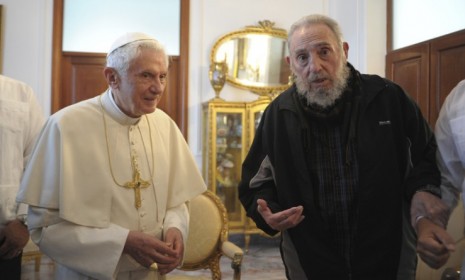Was Pope Benedict too soft on Fidel Castro?
The pontiff spent three days in Cuba and made polite calls for greater freedoms on the communist island. Should he have said more?

A free daily email with the biggest news stories of the day – and the best features from TheWeek.com
You are now subscribed
Your newsletter sign-up was successful
Pope Benedict XVI wrapped up a three-day visit to Cuba this week by meeting privately with Fidel Castro, the ailing 85-year-old communist leader who handed the presidency to his brother, Raul, six years ago. The Pope criticized the U.S. trade embargo, saying such sanctions "unfairly burden" the Cuban people, while making vague calls for greater freedoms, although he declined to meet with dissidents. Did Pope Benedict advance the cause of reform by giving the Cuban government a diplomatic nudge, or did he fail to speak up strongly enough for human rights?
The Pope really blew it: "The Pope is not a political figure," says Elliott Abrams at the Council on Foreign Relations, but if he can clearly call for an end to the U.S. embargo, why can't he speak up forcefully "on the far more fundamental issue of freedom?" The Castro regime "took the occasion of the Pope's visit to sweep up dissidents in a wave of arrests," yet the Pope didn't even address the matter. His silence "can only have demoralized those struggling and suffering for freedom."
The Week
Escape your echo chamber. Get the facts behind the news, plus analysis from multiple perspectives.

Sign up for The Week's Free Newsletters
From our morning news briefing to a weekly Good News Newsletter, get the best of The Week delivered directly to your inbox.
From our morning news briefing to a weekly Good News Newsletter, get the best of The Week delivered directly to your inbox.
Benedict's gentle prodding could move the needle: The long-awaited "'Cuban spring,' in terms of political change, is still a long way off," says David Adams at Reuters, and nothing Pope Benedict XVI could have said would have changed that. Still, thanks partly to his subtle diplomacy, the "visit seems to have ensured a growing role for the Church in Cuban society and politics, a potentially significant shift in the balance of forces in a country where religious faith was once scorned."
The trip was a wash: This high-profile trip "let everyone "claim a semblance of victory," says Andres Oppenheimer in The Miami Herald. The octogenarian Castros proved they "are not international pariahs who are shunned by many world leaders," and will try to use the Pope's visit to boast "of greater openness in order to attract foreign investments." And dissidents got to make their counterpoint, when a protester who shouted "down with communism" was "beaten and arrested in front of the cameras." So while the Pope could have done more, in the end, the PR battle was a "technical tie."
"Everybody won — and lost — in Pope's trip to Cuba"
A free daily email with the biggest news stories of the day – and the best features from TheWeek.com